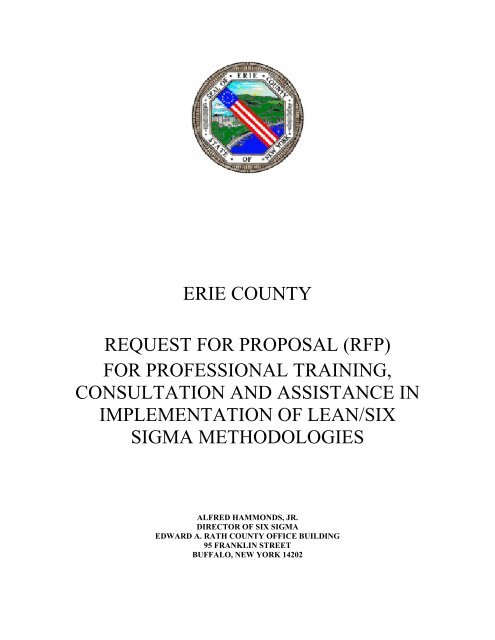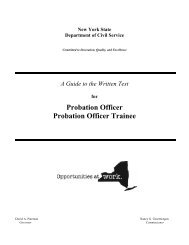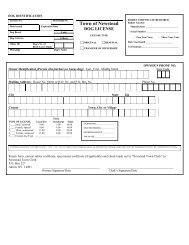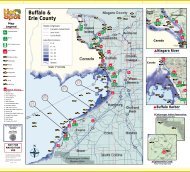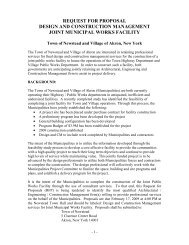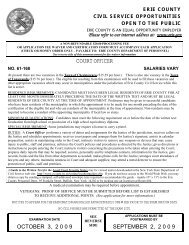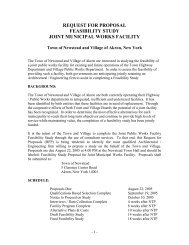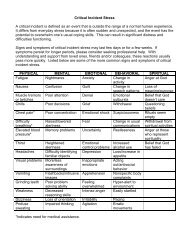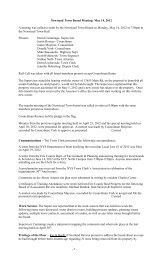ERIE COUNTY REQUEST FOR PROPOSAL (RFP) FOR ...
ERIE COUNTY REQUEST FOR PROPOSAL (RFP) FOR ...
ERIE COUNTY REQUEST FOR PROPOSAL (RFP) FOR ...
Create successful ePaper yourself
Turn your PDF publications into a flip-book with our unique Google optimized e-Paper software.
<strong>ERIE</strong> <strong>COUNTY</strong><br />
<strong>REQUEST</strong> <strong>FOR</strong> <strong>PROPOSAL</strong> (<strong>RFP</strong>)<br />
<strong>FOR</strong> PROFESSIONAL TRAINING,<br />
CONSULTATION AND ASSISTANCE IN<br />
IMPLEMENTATION OF LEAN/SIX<br />
SIGMA METHODOLOGIES<br />
ALFRED HAMMONDS, JR.<br />
DIRECTOR OF SIX SIGMA<br />
EDWARD A. RATH <strong>COUNTY</strong> OFFICE BUILDING<br />
95 FRANKLIN STREET<br />
BUFFALO, NEW YORK 14202
<strong>COUNTY</strong> OF <strong>ERIE</strong>, NEW YORK<br />
<strong>REQUEST</strong> <strong>FOR</strong> <strong>PROPOSAL</strong>S (<strong>RFP</strong>) <strong>RFP</strong>#08084VF<br />
<strong>FOR</strong> PROFESSIONAL TRAINING, CONSULTATION AND ASSISTANCE IN<br />
IMPLEMENTATION OF LEAN/SIX SIGMA METHODOLOGIES<br />
I. INTRODUCTION<br />
The County of Erie, New York (the “County”) is currently seeking proposals for Professional<br />
training, consultation and assistance in the implementation of Lean/Six Sigma Methodologies.<br />
Effective February 7, 2008, the Erie County Control Board approved a Director of Six Sigma for<br />
County of Erie, New York. Erie County Executive, Chris Collins has called for changes to the<br />
proposed operational effectiveness and adopted budgets within the departments & agencies<br />
within the County of Erie, New York, requiring the operational processes be transparent,<br />
quantitatively explicit in terms of outcome measures, and detailed in accounting for all costs and<br />
revenue sources for each area of service delivery. The Director of Six Sigma is seeking firms to<br />
help implement the changes in several phases. The first phase consists of comprehensive “Six<br />
Sigma Green Belt Training” for employees within the various departments and agencies within<br />
Erie County. The subsequent phases will consist of continued training and implementation of<br />
Lean/Six Sigma Methodologies within Erie County departments and agencies. Phase I should be<br />
completed by January 31, 2009. The subsequent phases should be implemented over calendar<br />
years 2009, 2010, & 2011 in time to be fully-implemented and utilized for the 2009 budget and<br />
thereafter. The proposing firms must have demonstrated a minimum of 5 years experience in<br />
implementing Lean/Six Sigma Methodologies within service and transactional environments.<br />
Firms must also submit references of training professionals their firm has provided consulting for.<br />
The County will only contract with firms that do not discriminate against employees or applicants<br />
for employment because of race, creed, color, national origin, sex, age, disability, marital status,<br />
sexual orientation or citizenship status.<br />
II. <strong>PROPOSAL</strong> PROCEDURES<br />
A. ANTICIPATED SCHEDULE OF <strong>PROPOSAL</strong><br />
Issue <strong>RFP</strong>: February 25, 2008<br />
Proposals Due: March 10, 2008<br />
Selection Made: March 17, 2008<br />
Contract Signed: Following Legislative Approval
B. REQUIREMENTS<br />
1. All firms submitting proposals must verify they have been in operation for a minimum of<br />
five years.<br />
2. References and resumes of training professionals with the submitting firm who have<br />
provided Lean/Six Sigma consulting.<br />
3. Firms must have a minimum 10 clients of which they have done Lean/Six Sigma training,<br />
consulting, and implementation work with a threshold of $300,000 to $500,000 in hard dollar<br />
verified savings.<br />
4. All proposals must include a proposed timeline.<br />
C. SCOPE OF PROFESSIONAL SERVICES REQUIRED<br />
The County seeks professional training and consultation services to assist in the<br />
implementation of Lean/Six Sigma Methodologies in a performance based system envisioned<br />
by the County Executive. All proposals must develop recommendations that are practical to<br />
Erie County, meaning the recommendations must not exceed the County’s ability to<br />
implement and properly utilize.<br />
Executive Overview/Champion Training:<br />
Day 1: Executive Overview<br />
Audience: Commissioners, Deputy Commissioners, Legislators, Union Leadership, & Directors<br />
The overview is designed to give the executive and/or owner of a department or function an<br />
introduction to Lean Six Sigma and Kaizen (continuous improvement) activities. It is presented as<br />
an interactive workshop in which attendees will learn the differences between Lean, Six Sigma<br />
and Kaizen events as a method of implementation. Participants will learn their role and<br />
understand the importance of commitment and support focusing on effective measurement and<br />
management of known aspect critical-to-quality (CTQs). Additionally, attendees will gain insight<br />
to Six Sigma’s formal problem solving methodology and the other tools that green belt candidates<br />
will use in solving organizational issues supporting continuous improvement.<br />
Day 2: Champion<br />
Audience: Deputy Commissioners, Directors, and Managers<br />
Executive and management level commitment is essential for a successful Six Sigma program. A<br />
formal Six Sigma program deployment assigns roles of ownership and responsibility for execution<br />
to many levels within the organization. Starting with the executive/owner, followed by a<br />
champion, and either Advanced Green Belts or Advanced Black Belts, and/or process owner, the<br />
deployment plan is formed and ready to begin. Critical to the success of the Lean Six Sigma<br />
program is the role of champion. In these sessions the Champions role is defined, the “Voice of<br />
the Customer” concept is presented, the DMAIC (define, measure, analyze, improve and control)<br />
problem solving approach is reviewed, measurement of results (including financials) is presented<br />
and stressed, and project management tools and concepts are taught.
Change Management Training:<br />
Audience: Everyone<br />
This course provides participants with knowledge, skills and tools to successfully manage and<br />
implement change in an organization. With a particular emphasis upon work practice changes<br />
required by a Lean work environment, the course leads participants through a series of topic<br />
presentations and interactive exercises that heighten self-awareness about their own responses to<br />
change and provide information and techniques to lead and support others in their change efforts.<br />
The trainer will request specific examples of Lean implementation activities to bridge content with<br />
actual workplace changes that are ongoing or planned.<br />
Embracing and Supporting Change During this module, you will be introduced to the dynamics of<br />
change within a learning organization. You will participate in a Change Quotient Self-Assessment<br />
to better understand your personal reaction to change. By understanding your own reactions, you<br />
will learn to better support others. Throughout the course, you will also learn how to avoid the<br />
pitfalls of change, as well as the five steps to success.<br />
Lessons:<br />
Truths about Change<br />
• Dimensions of Change<br />
• Characteristics of Effective Change Leaders<br />
• Common Responses to Change<br />
• Managing Responses to Change and Dealing with Resistance<br />
Prerequisites: None<br />
Lean Six Sigma 101 – (Equivalent to a Yellow Belt)<br />
Audience: Everyone<br />
Lean Six Sigma 101 (LSS 101) training will provide an overview of tools from these three<br />
methodologies: Change Management, Lean, and Six Sigma. The curriculum addresses Value<br />
Stream Mapping (VSM), Voice-of-the-Customer, DMAIC, QFD, and FMEA and will demonstrate<br />
how to identify and measure Critical-to-Quality metrics (CTQs) for the trainees and their<br />
respective area(s) of responsibility. The training is divided into two parts. The first phase of LSS<br />
101 training is an eight-hour session of classroom instruction and exercises. The second phase of<br />
LSS 101 training is a four-hour workshop to identify new and/or validate existing CTQs. The<br />
outcomes of the second phase of LSS 101 training will qualify/quantify the key measurable<br />
characteristics (CTQs) of each process or program (by functional area) establishing/confirming<br />
performance standards and/or specification limits that must be met in order to satisfy the patient or<br />
the identified customer.<br />
Classroom (8 hrs) deployment model:<br />
1. One 8-hour day of training<br />
2. Classroom training as a prerequisite to workshop<br />
3. Training conducted within one week of workshop session<br />
Workshop (4 hrs) deployment model:<br />
1. One 4-hr. training session utilizing 2 trainer/facilitators<br />
2, Training planned within one month of classroom session<br />
The trainer/facilitator will analyze the results of the LSS 101 Workshop and present<br />
recommendations that include prioritization of projects, suggested projects for the Advanced<br />
Green Belt Certification training, other information that will need to be made available for projects<br />
implemented during the Advanced Green Belt Certification training, etc.
Green Belt Certification (GBC) Program<br />
Audience: Deputy Commissioners, Supervisors, Managers, Foreman, Sr. Staff, Subject Matter Experts<br />
Using Six Sigma’s Define, Measure, Analyze, Improve, and Control (DMAIC) methodology, the<br />
GBC training will be delivered over the course of 72 hours of classroom instruction supported by<br />
a Master Black Belt (MBB) mentor. The MBB will mentor each GBC candidate on a weekly<br />
basis spanning the length of training. Each GBC candidate will learn the fundamentals of Lean<br />
Six Sigma systems and understand principles and concepts of quality management, QFD, FMEA,<br />
Value Stream Mapping, and Rapid Cycle Change in their area(s) of responsibility. The GBC<br />
candidates will learn how to apply the DMAIC 5-step problem solving process and 7 basic SPC<br />
tools. Using data collection and display, basic sampling, variable control charts, cause and effect<br />
analysis, and FMEA, course graduates will be able to effectively apply the Lean Six Sigma<br />
DMAIC methodology and tools at an advanced Green Belt level. The CTQ metrics established for<br />
respective functional area(s) during the “LSS 101” training will serve as the target projects for<br />
implementation during the classroom instruction and consultation. GBC candidates will document<br />
their respective projects and create a final report for presentation to management identifying the<br />
process improvement and financial impact for each project.<br />
GBC Training deployment model:<br />
1. Classroom: GBC candidates will attend instructor-led training that structured with<br />
workshop demonstrations and teambuilding exercises.<br />
2. GBC mentoring: Master Black Belt trainer/facilitator meets periodically with each GBC<br />
candidate to validate project progress, effective application of the DMAIC methodologies<br />
and tools, and to achieve financial impact.<br />
3. Prerequisite: GBC candidates should have completed LSS 101 training.<br />
4. Materials requirements: Students will need a laptop loaded with Minitab statistical<br />
software (version 14 or 15)<br />
Bridge-to-Black Belt (BTB) Program<br />
Audience: Deputy Commissioners, Supervisors, Managers, Foreman, Sr. Staff, Subject Matter Experts<br />
The Bridge-to-Black Belt training program to assist certified Green Belts in their goal to become a certified<br />
Black Belt. The Bridge to Black Belt program is presented in conjunction with Black Belt Certification<br />
training. Considering that these courses should run in tandem, and realizing that no two adults learn in the<br />
same manner, it was important to the success of the program to create an open environment by which each<br />
trainee could audit, as needed, the 200 hrs of Black Belt course instruction. The guidelines for each Bridge<br />
to Black Belt trainee are:<br />
(1) Review Green Belt exam results to determine the DMAIC area(s) for opportunities;<br />
(2) use the list of opportunities to review the Bridge to Black Belt agenda and match DMAIC areas<br />
requiring additional learning;<br />
(3) review the Black Belt agenda and list of opportunities to create a Bridge to Black Belt training calendar.<br />
Prerequisite: All trainees must have Green Belt Certification and successfully completed the Green Belt<br />
exam.<br />
OVERALL PROGRAM TIMING<br />
• Green Belt Training, Wave 1 – April, May, & June 2008<br />
• Champion Training - 2nd Quarter 2008<br />
• Green Belt Training, Wave 2 - Fall 2008<br />
• Change Management - 4th Quarter 2008
• Green Belt Training, Wave 3 - Spring 2009<br />
• Yellow Belt Training - 2nd Quarter 2009<br />
• Green Belt Training, Wave 4 - Fall 2009<br />
• Bridge to Black Belt Training - 2nd Quarter 2010<br />
C. NUMBER OF <strong>PROPOSAL</strong> COPIES<br />
Three (3) copies of the proposal should be submitted.<br />
D. INQUIRIES AND SUBMISSION OF <strong>PROPOSAL</strong>S<br />
Questions about the <strong>RFP</strong> and submission of proposals shall be directed to:<br />
Al Hammonds<br />
County of Erie<br />
Director of Six Sigma<br />
95 Franklin Street<br />
Rath Building, 16 th Floor<br />
Buffalo, New York 14202<br />
Phone: 716-858-4746<br />
Fax: 716-858-8411<br />
Email: hammonda@erie.gov<br />
All proposals must be delivered to the Division of Purchasing Office on or before March 10,<br />
2008 at 4:00 p.m. Proposals received after the above date and time will not be<br />
considered. The County is under no obligation to return proposals.<br />
E. TIME AND LOCATION OF PROPOSER’S PRESENTATION<br />
Selected proposers may be requested to provide oral presentations. Those proposers will be<br />
notified to arrange specific times.<br />
F. EFFECTIVE PERIOD OF <strong>PROPOSAL</strong>S<br />
All proposals must state the period for which the proposal shall remain in effect (i.e. how<br />
much time does the County have to accept or reject the proposal under the terms proposed).<br />
Such period shall not be less than 180 days from the proposal date.
G. RIGHT OF REJECTION BY THE <strong>COUNTY</strong><br />
Notwithstanding any other provisions of this <strong>RFP</strong>, the County reserves the right to award this<br />
contract to the firm that best meet the requirements of the <strong>RFP</strong> and not necessarily, to the<br />
lowest bidder. Further, the County reserves the right to reject any or all proposals prior to<br />
execution of the contract for any or no reason and without penalty to the County.<br />
H. AWARD OF CONTRACT<br />
The County shall select a firm by means of a Notice of Award issued by the <strong>RFP</strong> evaluation<br />
committee. Neither the selection of a firm nor the issuance of a Notice of Award shall<br />
constitute the County’s acceptance of the proposal or a binding commitment on behalf of the<br />
County to enter into a services contract with the firm, as any binding arrangement must be set<br />
forth in definitive documentation signed by both parties and subject to all requisite approvals.<br />
I. CONTRACT NEGOTIATIONS<br />
After issuance of the Notice of Award, the County intends to enter into contract negotiations<br />
with the winning firm who shall be required to enter into a written agreement, in a form<br />
approved by legal counsel for the County. The County reserves the right to negotiate the<br />
terms and conditions of the contract(s) with the selected proposer(s). These negotiations<br />
could include all aspects of services and fees.<br />
J. LEGISLATIVE & ECFSA APPROVAL<br />
The County reserves the right to require that acceptance of any proposal and the execution of<br />
the contract are and shall be expressly subject to the approval of the Erie County Legislature<br />
and Erie County Fiscal Stability Authority (ECFSA).


